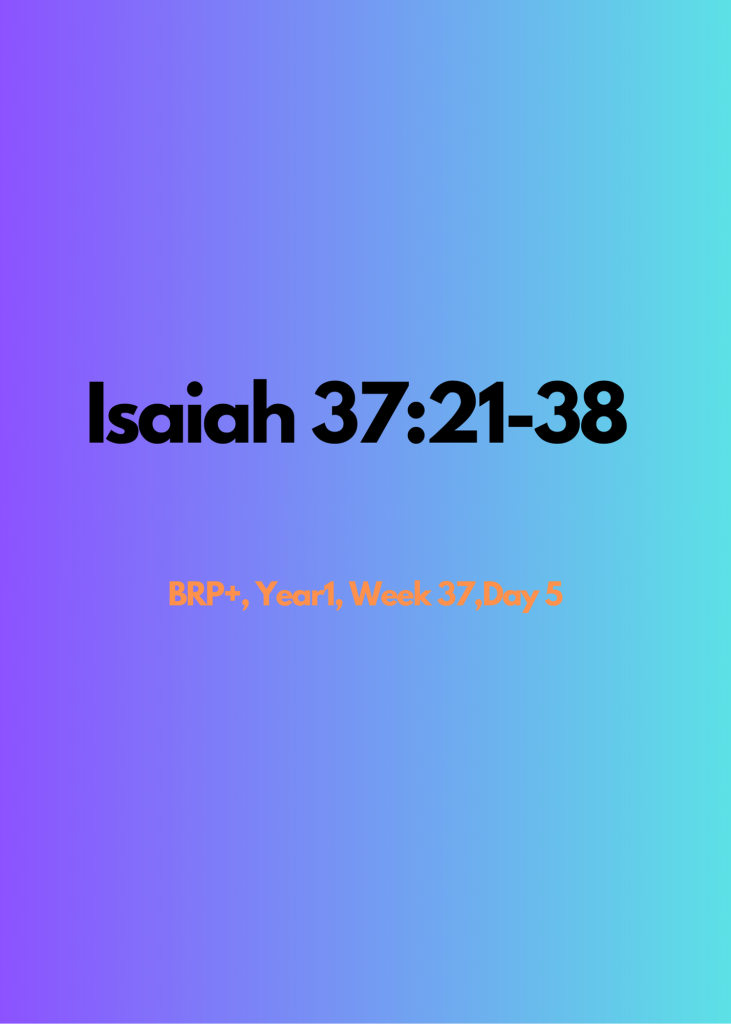Isaiah 37:21-38
Q.1. How did God comfort King Hezekiah? Why would God punish Assyria? What made Sennacherib’s boast presumptuous? Who raises empires and cause them to fall? – (Isa.37:21-29)
Hezekiah’s God-honouring prayer registered in Heaven. The Lord sent His response through His prophet, Isaiah (Isa.37:21-22). Sennacherib had tried to intimidate Judah. He claimed that his triumph over the nations would soon include Judah and Jerusalem. However, his claims were an affront to God Almighty – Whom have you reproached and blasphemed? And against whom have you raised your voice and haughtily lifted up your eyes? Against the Holy One of Israel! (Isa.37:23). The king of Assyria, in his pride, had overlooked God’s part in his successes – Have you not heard? Long ago I did it, from ancient times I planned it. Now I have brought it to pass, that you should turn fortified cities into ruinous heaps (Isa.37:26). Assyria’s fortunes were about to change – 28 “But I know your sitting down and your going out and your coming in and your raging against Me. 29 … Therefore I will put My hook in your nose and My bridle in your lips, and I will turn you back by the way which you came (Isa.37:28-29).
Q.2. What assurance did God give King Hezekiah? Was this a prophecy for then or later? What would happen to the Assyrian threat? How was Judah’s escape possible against such odds? – (Isa.37:30-35)
God’s message to Hezekiah was very different. He gave him a sign so that no one could deny that this was God’s doing – Then this shall be the sign for you: you will eat this year what grows of itself, in the second year what springs from the same, and in the third-year sow, reap, plant vineyards and eat their fruit (Isa.37:30). Since no actual damage was done by Assyria, it appears that the prophecy speaks of the immediate and long-term future of the surviving remnant – 31 The surviving remnant of the house of Judah will again take root downward and bear fruit upward. 32 For out of Jerusalem will go forth a remnant and out of Mount Zion survivors. The zeal of the Lord of hosts will perform this (Isa.37:31-32 c.f. Isa.37:33). It was a strong promise of God’s intention for Israel. Many today apply the general principle of fruitfulness to the strategy of disciple-making. As for the Assyrians, they would not even be able to shoot an arrow against Jerusalem in battle (Isa.37:33-34). Why? Though David had died generations before, God still remembered his devotion – For I will defend this city to save it for My own sake and for My servant David’s sake (Isa.37:35).
Q.3. Why did Sennacherib, king of Assyria, withdraw his army? Where did he go? What happened to him? Who succeeded him? – (Isa.37:36-38)
The great King Sennacherib was forced to return home after – the angel of the Lord went out and struck 185,000 in the camp of the Assyrians; and when men arose early in the morning, behold, all of these were dead (Isa.37:36-37). Worse was to come when he was worshiping his god in Nineveh – It came about as he was worshiping in the house of Nisroch his god, that Adrammelech and Sharezer his sons killed him with the sword; and they escaped into the land of Ararat. And Esarhaddon his son became king in his place (Isa.37:38).

